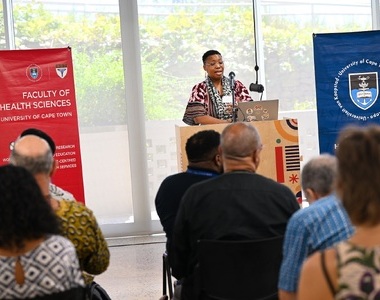300 grad ceremonies: Dr Karen van Heerden hangs up her hat
19 December 2023 | Story Helen Swingler. Photo Nasief Manie. Read time 5 min.
The 14 December graduation ceremony for the faculties of Humanities and Law marked several academic milestones for the University of Cape Town’s (UCT) graduands. But there was one that recognised a stalwart of graduations: Dr Karen van Heerden’s 300 graduation ceremonies in her 22 years.
Dr Van Heerden is the director of Special Projects in the Office of the Registrar. She started her career at UCT as the faculty manager in Humanities in January 2002, then became deputy registrar in 2007. For the past year, she has worked in the Special Projects role, “‘handing over institutional memory”, she said.
As Van Heerden retires at the end of this year, this was her last official graduation season, and she was asked to stand to receive special acknowledgement of her dedication to her role at graduation ceremonies over the 22 years.
Key person at graduations
Addressing the congregation, master of ceremonies Deputy Vice-Chancellor for Transformation, Student Affairs and Social Responsiveness Professor Elelwani Ramugondo said, “Karen has for the past 22 years been a long-serving senior staff member at UCT and for most of her time up until recently has been a key person involved in the arrangements for our graduation ceremonies.
“Over a span of more than two decades, the impact of her contribution has been evident.”
“Over a span of more than two decades, the impact of her contribution has been evident and in service of thousands of students, parents, staff and many more who have had the opportunity to attend a UCT graduation event.”
Professor Ramugondo added, “Karen, in her time, has overseen around 300 graduation ceremonies. And if we use as an average 300 graduands per ceremony, plus parents and family members who attend the pinnacle institutional academic event that recognises academic achievement, which is what graduations are, then close to 200 000 lives have been positively enriched through processes that Karen has touched.
“Tonight’s ceremony is the last bar one that Karen will be present at, and we acknowledge her at this ceremony given that her roots are in the humanities, and it is from this platform that she has so loyally served our institution up to this point and just before her imminent retirement. We thank Karen sincerely and wish her well in her next chapter.
“The best tribute we can offer Karen is that we will always strive to make sure that UCT graduation ceremonies will continue to be the wonderful events that they are and which she has helped to shape over the past two decades.
“Thank you, Karen.”
Wide-ranging changes
Commenting on the changes she has witnessed in this time, Van Heerden said the university administration had grown both in scale (student headcount) and in complexity of processing.
“Being part of the transition as we moved from paper-based to system transactions, and then expanding how we use the system has been challenging and offered great scope for change. University administration is certainly never boring!”
Reflecting on the wide varieties of responsibilities, Van Heerden said many of these seemed quite unexpected.
“I’ve always appreciated the ‘graduate outcomes’ our graduates offer and seen the huge value they bring to the university administration.”
“[For example], arranging protocols for exams in 2008 during power outages in the time when we did not yet have generators, arranging exams in the marquees on the rugby fields during the [2017] student protests, arranging an outdoor ‘graduation walk’ during the [COVID-19] lockdown, and the reception and issue of laptops to over 4 000 first-years in January 2021, when face-to- face orientation and registration were not possible.”
One of the most gratifying aspects has been that she has worked at UCT long enough to see students who worked as ‘temps’, assisting at graduations or during registration become junior staff members and rise through the ranks into management positions.
“I’ve always appreciated the ‘graduate outcomes’ our graduates offer and seen the huge value they bring to the university administration. But I think what I appreciate most is the people (students and staff) with whom I engage daily – in formal meetings, on email, or in the corridors.
“I’ve enjoyed being part of the UCT community and will miss the many formal and informal interactions with the people who compose the UCT community.”
 This work is licensed under a Creative Commons Attribution-NoDerivatives 4.0 International License.
This work is licensed under a Creative Commons Attribution-NoDerivatives 4.0 International License.
Please view the republishing articles page for more information.






























































































































































































































































































































































































































































